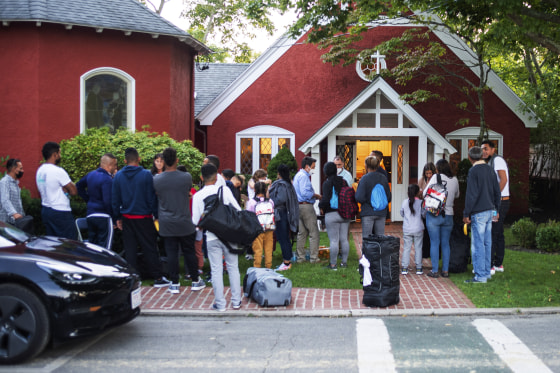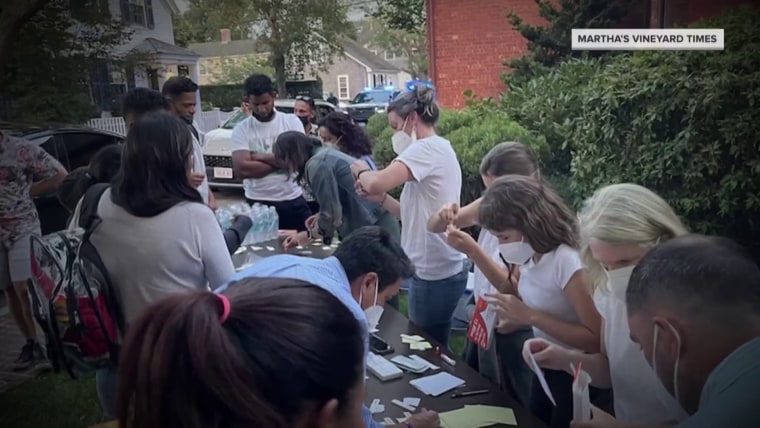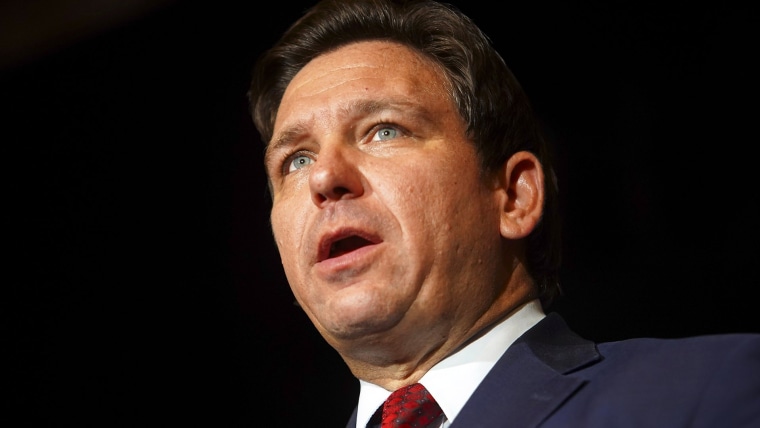Florida lawmakers passed a bill Friday expanding a program used to fly migrants to Democratic-led cities and states. Republican Gov. Ron DeSantis’ administration will now be able to relocate migrants elsewhere from any state in the country, not just from Florida.
The bill formally creates the Unauthorized Alien Transport Program, building out a program enacted by DeSantis last year that enabled government officials to fly migrants to destinations in blue states that have sanctuary policies in place.
The move suggests that DeSantis has no intention of shying away from the contentious methods his administration has used to deal with migrants. Conservative allies have pointed to the practice as a necessary tool to draw attention to the border crisis in the U.S. GOP state Rep. John Snyder also argued during floor debate on Thursday that the program was "humanitarian" because it offered a "free, chartered flight" for migrants who want to move elsewhere in the country.
But Democrats and human rights advocates have decried expansion of the program, which some have compared to human trafficking. And in floor debate on Thursday, Democratic legislators also wondered why Florida taxpayer money should be used to to transport migrants from other states.
The bill passed both Republican-led chambers along party lines and now goes to DeSantis for his signature.
Jeremy Redfern, a DeSantis spokesperson for DeSantis, said the governor will review the bill "in its final form and decide on the merits of the bill as presented."
In September, DeSantis flew two planes with 49 migrants aboard from Texas to Martha’s Vineyard, saying that the funds to pay for it came from his latest budget.
The move drew harsh criticism from Democrats and immigrant advocates, who helped many of the migrants sue DeSantis and other state officials alleging they were victims of fraud for political purposes. Some migrants who were transported said they were not clearly told where they were going.
A Democratic state senator also sued DeSantis over the relocations, saying they violated state law because the migrants were being moved from another state, not Florida. The new legislation would address that issue, allowing Florida officials to transport migrants from anywhere in the country — a modification that could nullify the suit.
The latest bill also authorized the governor’s administration to build out the expanded program by granting contracts to companies tasked with doing so.
It’s one of several controversial bills in the Legislature’s two-week special session that promises to further elevate the reputation of DeSantis — a potential 2024 presidential candidate — among national conservatives. Other bills under consideration include one that would bring Disney’s special governing district under direct state control. The move was a response to the company’s criticism last year of a DeSantis decision to prohibit teacher-led discussion or instruction of gender and sexual orientation in schools for kindergarten through third grade.
Another bill before the Legislature expands the jurisdiction of a statewide prosecutor to prosecute election crime charges brought by the governor's new election police force.
Passage of the bill expanding the migrant transport program comes weeks after hundreds of Cuban and Haitian migrants arrived in the Florida Keys, many of whom had made the treacherous journey in handmade boats. Republican leaders in the Florida Legislature have said that the expansion of the program is designed “to respond to the influx of migrants landing in the Florida Keys.”
The measure will “facilitate the transport of inspected unauthorized aliens within the United States,” according to bill’s language. The law defines that group of people as individuals who have “documentation from the United States Government indicating that the United States Government processed and released him or her into the United States without admitting the individual in accordance with the federal Immigration and Nationality Act.” That refers to people who have been admitted into the U.S. while a decision on immigration and asylum claims are pending.
The law takes explicit aim at the Biden administration, featuring language stating that “the Federal Government has failed to secure the nation’s borders” and has “proven itself unwilling to address this crisis” and that “without such action” by Florida lawmakers, “detrimental effects” could occur, like “increased crime, diminished economic opportunities and wages for American workers, and burdens on the education and health care systems.”
In September, DeSantis said that “it’s better” for migrants “to be able to go to a sanctuary jurisdiction” and that the program would “help facilitate transport” for migrants to “greener pastures.”
DeSantis has more recently defended the measure as having had a “deterrent effect” on migrants coming to Florida.
“People are sick of having an open border with no rule of law in this country,” he said at a news conference last week. “We can just sit here and do nothing about it or we can actually stand up and say, ‘Whatever tools we have at our disposal, we are going to be using.'”
Republican governors across the country — including Greg Abbott of Texas and former Arizona Gov. Doug Ducey — have in recent months begun busing migrants to liberal strongholds to call attention to what they say are the Biden administration’s failed border policies. Thousands of migrants have since arrived in New York, Washington, Chicago and elsewhere, sending officials in those cities scrambling to provide support services to them. Texas alone has sent nearly 15,000 migrants to other cities since April, according to a review by NBC News.



